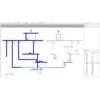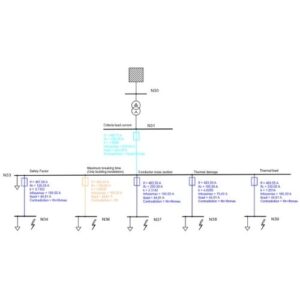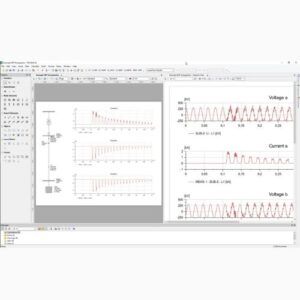Harmonics / Harmonic Contingency (OB) Siemens PSS SINCAL Core Modules
Description
Harmonics / Harmonic Contingency (OB) Siemens PSS SINCAL Core Modules
Harmonics / Harmonic Contingency (OB)
Requirements and Use Cases
When planning and designing electrical networks, it is also useful to observe the frequency-dependent behavior of equipment and the resonance or damping of the harmonics emitted by individual devices:
- Determination and analysis of the frequency-dependent behavior of the network and the resonance frequencies for the current network state
- Automatic execution of the analysis for a high (combinatoric) number of network states (switchovers, maintenance) or depending on all possible positions of controllable elements (e.g. capacitors) in order to include all network configurations in the analysis
- Compliance with regulatory requirements for voltage quality of the permissible minimum and maximum harmonics and distortions of the voltage in the network
- Prevention of harmonics visible in the lighting (flicker)
- Protection of equipment (e.g. capacitors) against damage or destruction by voltages and currents of higher frequencies
- Selection of the vector group of transformers for targeted suppression of individual harmonics (e.g. 5th?and 7th?for YY0 and YY1)
- Design and placement of filters
- Reduction of network areas (boundary networks) as resonance networks, considering the frequency-dependent behavior and the switching states and tap positions of controllable elements (e.g. reconnected filters)
- Integration of the measured behavior of subnetworks that were not simulated in detail in the network model
Solution
The module (OB) in PSS?SINCAL offers the user the calculation of frequency responses in static network configurations as well as in combinatorial configurations in harmonic contingency calculation and the calculation of harmonics distribution limit. Furthermore, a functionality for filter design is available.
- Extension of the network model with frequency-dependent model behavior
- Modeling of active and passive resonance networks
- Extensive options for modeling sources with harmonic emission
- Calculation of frequency responses for static states as well as harmonic contingency calculation (malfunction calculation for harmonics): (1)?Evaluation of the results for voltages and currents in relation to the limit values from standards IEEE 519 (TIF and IT), THFF and EDC, NY x UNY and NY x INY, IEC 61000-2-4 class 1, 2, or 3 -AND- (2)?Evaluation of the results for voltages and currents in relation to user-defined limits
- Graphical display of gain levels over frequency, frequency response locus, impedance areas and harmonic levels in diagrams
- Function for detecting resonance points and for filter design of filter groups
Core Modules
PSS?SINCAL Core Modules
From Power Flow and Short-Circuit, all the way to Harmonics, discover the core calculation modules for unlocking many other calculations in PSS?SINCAL. Learn more about the additional core engine PSS?NETOMAC enabling stability and transient analysis.







Reviews
There are no reviews yet.